Picture: Tasting with Amei Prüm, Weingut J.J. Prüm, Mosel
We spent 7 days (Thursday, May 05, 2016 – Wednesday, May 11, 2016) touring 5 wine German regions (Rheingau, Mittelrhein, Ahr, Mosel and Nahe), tasting fabulous wines, meeting world-renowned wine makers, visiting a top notch Sekt house, and delving deep into German history and culture.
The group was small - there were 5 of us, including Annette and Christian Schiller. This posting provides an overview. More specific postings focusing on individual events will follow (see list below).
On the Germany-North Tour 2016 by ombiasy WineTours, we visited a total of 17 wineries in 5 different wine regions: Rheingau, the jewel in the crown, with its perfect, fuller bodied, racy Rieslings; Mittelrhein where the Rieslings grow on the steep slopes of the fortress- and castle-ribboned banks of the Rhine river; Ahr with its sun collecting canyons perfect for the finicky Pinot Noir grape; Mosel with its dizzying steep vineyards and famous elegant Rieslings; Nahe and its serene, peaceful valley where perfect harmonious wines reflect their roots.
Annette Schiller: Our way of traveling allows wine lovers to fully experience authentic Germany. Drawing on our love and deep knowledge of Germany and close personal ties to many personalities in the wine scene, our small group visits many of the hidden gems that other tours pass by, but which are essential to comprehend what German wine is all about.
Germany-North Tour 2016 by ombiasy WineTours
DAY 1: Thursday, May 05
09:30 am Departure in Frankfurt.
10:15 am Visit and tasting at winery von Oetinger in Erbach, Rheingau.
Owner and winemaker Achim von Oetinger was our host.
The family of the „Knights and Nobles“ von Oetinger can look back to the year 1828 for winemaking tradition in Erbach. In 1958 the estate was divided between the brothers Eberhard and Robert. Recently the two estates have become one again and the winery is managed by Achim von Oetinger, Robert’s grandson, and his wife Julia. Achim’s uncle Eberhard was a very prominent personality in the German wine world; famous for his skills as auctioneer at the world-renowned wine auctions in the Eberbach Abbey and nicknamed the Karajan of wine auctions. 30 acres of vineyards now belong to the estate, of which 90% are planted with Riesling, the rest with the Burgundy grapes: Pinot-Noir, Pinot-Blanc, Pinot-Gris. Achim pursues quality with a vengeance and the perfect combination of traditional Rheingau values and modern business management produces wines that increase in quality from one year to the next. Last year, Germany’s most famous wine critic, Stuart Pigott, nominated Achim von Oetinger “discovery of the year”.
12:20 pm Lunch at the restaurant of Eberbach Abbey.
Still a world-class winery today, the Eberbach Abbey is a former Cistercian monastery, founded in 1136 by Bernard of Clairvaux as the first Cistercian monastery on the eastern bank of the Rhine River. Today Eberbach Abbey is one of the five State-owned wineries (the State of Hesse is its proprietor) and with 500 acres the largest winery in Germany. Its Romanesque and Gothic buildings are impressive. The vineyards of Eberbach Abbey were, at 750 acres, the largest in medieval Europe.
02:00 pm Guided tour of the Eberbach Abbey
We got an in-depth guided tour of the Abbey, including a visit of the old monk’s dormitory where every year the famous auction of premium German wines takes place. A very special treat was a peek into the treasure chamber, where century old wine bottles are still stored and where the movie “The Name of the Rose” with Sean Connery was filmed in 1986.
03:15 pm Tasting at winery Chat Sauvage in Johannisberg, Rheingau.
Technical Director Michel Städter was our host. Our visit coincided with Weingut Chat Sauvage’s “Schlemmerwochen” (gourmet week) event.
Weingut Chat Sauvage is the odd ball among the traditional century old wineries in the Rheingau. It was founded in 2001 and is the baby of Günter Schulz, who made his money - and still does - outside of the wine industry. The Burgundy grapes are his passion, in particular Pinot Noir. He had the dream to create his own top notch Pinot Noir in the Rheingau where there is a tradition of producing premium Pinot Noir. The winery is run by Michel Städter, who is also the cellar master. 4/5 of the production is Pinot Noir and 1/5 is Chardonnay. 2/3 of the vineyards are steep slopes. All work in Chat Sauvage’s vineyards is manual work. Considerable attention is paid to keeping the yields low, with first pruning after flowering, a green harvest, as well as selective hand-picking. In the cellar, traditional maceration, 18 months aging in barrique and no filtration are among the guiding principles for making premium wines.
05:30 pm At Hotel F.B. Schönleber in Östrich-Winkel.
Hotel F.B. Schönleber in Östrich-Winkel is a 3 star, small, cosy, meticulously kept family-run hotel within the Wein-und Sektgut F.B. Schönleber in the picturesque wine village of Östrich.
06:30 pm Cellar tour and tasting at Wein- und Sektgut F.B. Schönleber in Östrich-Winkel, Rheingau.
Owners/winemakers Bernd and Ralf Schönleber were our hosts.
With the highest per capita ratio, the Germans are world champions in sparkling wine (called “Sekt” in Germany) consumption and also top Sekt producers. It was againsts this background that we visit a top Sekt House, which focuses on quality and produces Sekt made only in the traditional bottle fermentation method. The Schönleber family can trace its viticulture tradition back to the year 1783. Today the winery is managed by winemaker brothers Bernd and Ralf Schönleber. They own 25 acres of vineyards of which 94% are planted with Riesling and 6 % with Pinot Noir, and they produce 80,000 bottles of Riesling and 20,000 bottles of Sekt, the German equivalent of Champagne. The quote of the GaultMillau wineguide for Germany says it all: “This is one of the most reliable wine estates of the Rheingau and it thoroughly understands how to produce top dry Rieslings and excellent sparkling wines.”
07:30 pm Dinner at wine restaurant F.B. Schönleber.
Bernd and Ralf’s parents are operating the hotel and wine restaurant. We had dinner there with matching wines. Bernd, Ralf and their father joint us for part of the dinner. I had Steak Tartare.
DAY 2: Friday, May 06
09:30 am Vineyard tour, cellar tour and tasting at winery Leitz in Rüdesheim.
Johannes Leitz was our host. He gave us a spectacular vineyard tour and showed us his new production facility. New Managing Director Markus Röll led the tasting.
The Leitz Family’s viticulture history goes back to 1744 and has been passed on from one generation to the next for almost four centuries. Johannes Leitz, the current owner and winemaker, took charge of the estate in 1985, when he was in his early 20s. At that time, the winery had 7.5 acres of vineyards and was unknown among German wine connoisseurs. Under the leadership of Johannes “Josi” Leitz, the winery grew in size to 100 acres, and he pursued quality in an uncompromising manner. 99% of his vineyards are planted with Riesling. He was able to acquire top Riesling sites in the famous Rüdesheimer Berg (= mountain) vineyards - Berg Schloßberg, Berg Roseneck and Berg Rotland, on the mountain above Rüdesheim facing the south. Unusual for a German winery, Josi exports 90% of his wines, with the US being the most important market.
12:00 am Lunch at restaurant Kronenstube in the hotel Krone in Assmannshausen.
Since 1541 the hotel Krone which sits right on the bank of the Rhine River is a well-known address for a refined life style and the restaurant has been recognized as a paradise by gourmets and bon vivants from all over the world.
02:15 pm Cellar tour and tasting at winery August Kesseler in Assmanshausen.
Winemaker Simon Batarseh was our host.
August Kesseler was only 19 years old when he had to take over the winery from his parents. In those days there were only 4,5 acres of vineyards and the wines were sold in bulk. August developed the winery into a prominent estate of 49 acres and into a flagship for German Pinot Noir. The manor house sits directly on the slate outcrops of the famous vineyard site “Assmannshäuser Höllenberg” and the cellar is hewn into the slate rocks. The micro-climate and porosity of the soil make the Assmannshäuser Höllenberg an ideal site for Pinot Noir. August also has vineyards in the extremely steep and very warm Rüdesheim hills. These vineyards are planted with Riesling and produce gorgeous wines with concentrated fruit and perfect acidity.
05:05 pm Rhine River cruise from Lorch to Boppard.
Cruise on the Rhine, passing the famous Loreley Rock and the slopes of the Mittelrhein wine region. Time to indulge in the breathtakingly beautiful view of the Rhine River and its banks dotted with vineyards, and castles, fortresses, and ruins dating from the middle ages. The Middle-Rhine valley is listed as a UNESCO World Heritage site.
07:00 pm At Hotel- and Golfresort Jakobsberg, in Boppard, Mittelrhein.
Hotel- and Golfresort Jakobsberg in Boppard is a 4 star luxurious hotel in the mountains overlooking Boppard with a fantastic view on the Rhine River and the “Bopparder Hamm”, the famous vineyard site.
DAY 3: Saturday, May 07
09:30 am Tasting at winery Matthias Müller in Spay, Mittelrhein.
Owners/winemakers Matthias Müller and son Johannes Müller were our hosts. Our visit coincided with Weingut Matthias Müller’s annual presentation of the new vintage.
For more than 300 years the Müller family has cultivated vines in the steep vineyards of the famous Bopparder Hamm. The winery currently has 42 acres under vine and 95% is planted with Riesling. Riesling flows through the veins of Matthias Müller. His familiarity with the innate characteristics of his vineyard sites lets him imagine a wine’s possible potential and he follows his instincts during production. His first-class Rieslings are racy, fruit-driven, and very lively. Son Johannes finished his oenology studies at the University of Geisenheim and slowly the torch is passed to the next generation. Johannes already set his mark in 2013 by planting Weissburgunder (Pinot Blanc) grapes.
11:00 pm Following the tasting, en route to Boppard, we stopped in the famous Bopparder Hamm.
12:00 pm Lunch at the beautiful Belle Epoque restaurant Le Bristol in the Hotel Bellevue in Boppard right on the bank of the Rhine river.
01:45 pm Departure and drive to the northernmost red wine region, the Ahr.
03:00 pm Visit and tasting at Winzergenossenschaft Mayschoss in Mayschoss, Ahr.
This estate lies in a breathtakingly beautiful area of the Ahr valley. The Winzergenossenschaft Mayschoss is the oldest wine cooperative world-wide. It was established in 1868 by 18 founding members. The coop grew fast; by 1881 it already had 141 members. Today, after two mergers with neighboring coops the membership is at 420 winegrowers who farm 425 acres of vineyards – among them vineyards is the most prominent sites of the Ahr valley. 60% is planted with Pinot Noir, 20% with Riesling, 5% with Frühburgunder (also known under the names Pinot Madeleine or Pinot Noir Précoce) and 15% with a variety of other grapes. The coop produces 1,3 million bottles of wine, annually.
05:15 pm At Steigenberger Hotel in Bad Neuenahr.
The Steigenberger Hotel in Bad Neuenahr is a 4 ½ star hotel that combines the graciousness of the past with modern comforts of today. Excellent spa facilities using the hot springs of the spa town Bad Neuenahr and the location at the Kurpark near the banks of the Ahr River make this hotel very special.
The evening was free to explore the charming spa town which is famous for its hot springs or use the spa facilities of the hotel.
DAY 4: Sunday, May 08:
09:45 am Tasting at winery Kreuzberg in Dernau, Ahr.
Owners/winemakers Ludwig Kreuzberg and Frank Josten were our hosts.
This winery has long been recognized as one of the top estates for producing great Pinot-Noirs. The Ahr valley north of the 50 °latitude is unquestionable the northernmost region for producing top Pinot-Noirs. The secret lies in an ideal micro-climate found in the narrow canyons along the river with their very special geological conditions, and south-facing slopes. Wine making along the tiny Ahr river goes back to Roman times. The winery Kreuzberg is a young estate by German standards. It was founded in 1953 by the grandfather of the current co-owner, Ludwig Kreuzberg. However the Kreuzberg family was involved in wine before and active in the local wine cooperative. Today’s winery encompasses 22 acres of vineyards, among them 8 sites that are classified as “Grosses Gewächs”. 2/3s of their vineyards are on steep slopes with a high proportion of Devonian slate; soils that give the Ahr wines their typical character. Ludwig Kreuzberg does not believe in trendy winemaking techniques. His top wines spend considerable time ageing in barriques.
11.45 am Guided tour through the historic underground safety bunker of the West German Government.
We experienced recent post World War II history. The Ahr valley is just a 30 minute drive from Bonn, which was the temporary West German capital from 1947 until reunification in 1990. Here, under the Ahr mountainous vineyards an old train tunnel lays dormant. During the “Cold War” period the Germans decided to convert the tunnel to an atomic bomb proofed underground facility of 897 offices and 936 bedrooms to where the government could be evacuated in case of a threat and political emergency.
01:30 pm Lunch at Gutsschänke Meyer-Näkel in Dernau.
03:00 pm Drive to the Mosel Valley.
04:30 pm Tasting at winery Markus Molitor in Haus Klosterberg, Mosel.
Markus Molitor was in Asia and his partner Eike Kaspari was our host. Our visit coincided with Weingut Markus Molitor’s annual presentation of the new vintage.
“80% inclination – 94% Riesling – 100% passion” that is the slogan of Markus Molitor, the Falstaff (Austrian life style magazine) winemaker of the year 2014. Ungrafted vines, some of them more than 100 years old, form the basis for the Molitor incomparable, fine Mosel Reslings. This is quite a large estate with 150 acres of vineyards spread out within the Mosel and Saar valley. Because of the diversity of the slate soils and microclimates of the different vineyard sites, the wines at this estate represent every variety of Mosel wine. Due to the extreme steepness of the vineyard sites and passion for quality, everything is harvested by hand. Harvest is a decisive factor for the quality of the wines. Despite the increased risk, Markus Molitor harvests quite late. This gives the grapes time to ripen physiologically – the most important criterion to develop the optimum balance of the wines with increased extract values and animating acidity.
From Weingut Markus Molitor you have a good view of the new Mosel bridge which is being built notwithstanding massive opposition.
06:45 pm At Hotel Bellevue in Traben-Trarbach, Mosel.
Hotel Bellevue in Traben-Trarbach is a 4 star romantic and very elegant spa hotel of the Belle Epoque era where the rich and famous of this bygone era stayed when they visited the Mosel.
DAY 5: Monday, May 09
09:45 am Tasting at winery Jos. Jos. Prüm in Bernkastel-Wehlen, Mosel.
Amei Prüm was our host.
The contrast cannot be bigger between our previous winery visits and a visit to this world-famous estate on the banks of the Mosel River. At the J.J. Prüm winery all wines are Rieslings and all are sweet. The wines are of great aristocracy, and are renowned for their precision, focus, finesse, and legendary ageing potential, regardless of the way how they achieved their level of sweetness (by chaptalizing or adding sweet reserve or through noble rot). Viticulture traditions in the Prüm family go back to the 17th century, although the J. J. Prüm estate as we know it today, only came into being in 1911 when the property was divided up between seven heirs. Third generation Dr. Manfred Prüm, is the winemaker and owns the estate together with his brother Wolfgang Prüm and his daughter, fourth generation Dr. Katharina Prüm. To describe what winemaking in the Mosel region means, I like to second what Katharina once said: “The Mosel region boasts the coolest climate for wines in the entire Europe, which has both its advantages and disadvantages. Riesling grapes have a longer maturation time on the vines, resulting in more natural acidity and freshness but it’s also harder to achieve ripeness”.
11:45 am Departure and short drive to the village of Bernkastel-Kues.
12:00 pm We took a quick look around in this picture-perfect little town with its half-timbered houses and the famous vineyard “Bernkasteler Doctor”, which sits right at the edge of town.
12:30 pm Lunch at restaurant Ratskeller in Bernkastel-Kues.
02:15 pm Tasting at winery Schloss Lieser in Lieser, Mosel.
Owner/winemaker Thomas Haag was our host.
Lieser is a small wine village on the bank of the Mosel river and its landmark is a mighty slate castle, once belonging to the Barons of Schorlemer. In 1904 Clemens Baron of Schorlemer, Secretary of Agriculture in the Prussian government of Emperor William II, built the wine estate Schloss Lieser next to the castle and produced some of the greatest wines of the Mosel region. In 1970 the estate was sold and changed hands several times leading to a decline in quality of the wines and the estate. In 1992 Thomas Haag was hired as general manager and cellar master to turn around the estate. This was a tremendous challenge since the winery, buildings, and vineyards were in a very bad shape and without any established clientele or library of wines. Thomas Haag - graduate of the oenolological university in Geisenheim - had numerous years of experience at his parent’s 400 year old premium wine estate in Brauneberg -just 8 minutes from Lieser- and was therefore the perfect candidate for this endeavor. He was able to purchase Schloss Lieser in 1997 and with relentless work he successfully restored the estate to its former glory. The reward came this year: The GaultMillau honored Thomas Haag as “winemaker of the year 2015” and the winery Schloss Lieser got its 5th grape, the highest classification which was awarded to only 11 wineries in all of Germany.
05:00 pm At Mercure Hotel in Trier.
The Mercure Hotel in Trier is a modern 4 star hotel near the heart of the city center and just across the street from the Porta Nigra.
05:30 pm Sightseeing tour through Trier.
Trier sits on the banks of the Mosel River and is the oldest city in Germany. In Roman times it was the largest city north of the Alps, and the second most important city of the Roman Empire. For some years it even became an imperial city. This 2000 year old city is a treasure trove of Roman and German history, and pagan and Christian culture. There is so much to see in Trier, but the famous landmarks from Roman times are a must: the Porta Nigra, the amphitheatre, and the imperial thermal baths. The most eminent citizen of Trier in modern times was Karl Marx, who was born and raised here.
The city tour ended at the wine tavern of Weingut Reichsgraf zu Kesselstadt, where we had dinner.
DAY 6: Tuesday, May 10
09:30 am Cellar tour and tasting at winery Forstmeister Geltz-Zilliken in Saarburg, Saar.
Hanno Zilliken was our host.
The Zilliken family traces its winegrowing tradition back to 1742. Royal Prussian Forest Superintendent Ferdinand Geltz (1985 –1925) however laid the groundwork for what would become one of the grandest family-owned estates in the Mosel appellation. He was also co-founder of the Association of Elite Wine Estates (VDP). Today Hanno Zilliken and daughter Dorothee, both gifted winemakers run the estate with Hanno’s wife Ruth overseeing sales. The 27 acres of vineyard are planted with 100% Riesling. For generations the family owns parcels in the famous Saarburger Rausch, a spectacular steep site with unique climatic conditions. The wines are very slowly fermented in aged wooden casks in the deepest cellar in the Saar valley – three stories beneath the earth’s surface with humidity and cool temperatures of around 11 degrees Celsius. The bottled Rieslings are stored here too, sometimes for decades. I quote the Zillikens: “Our wines are intended to mature. Many wines take decades to mature.”
11:30 am Departure and drive to the Nahe wine region.
01:00 pm Lunch at restaurant Landgasthof Zur Traube in Meddersheim, Nahe.
Former Michelin-starred Chef Herbert Langendorf (Ente in Wiesbaden) cooks here (just around the corner of Weingut Hexamer).
03:00 pm Tasting at winery Schäfer-Fröhlich in Bockenau, Nahe.
Mats Genheimer, the partner of Heike Peter, the sister of Tim Fröhlich, was our host.
The Fröhlich family has been cultivating vines since 1800. In the early 90s Tim took over the family estate and created his own first vintage in 1995. Since then he has been awarded lots of titles by various German wine competitions, such as winemaker of the year by Gault-Millau, number one at the Berlin Riesling Cup, etc. The outstanding steep vineyard sites are the foundation for unmistakable, authentic wines. In conjunction with these great sites, low yields, painstaking vineyard management, a strong feeling for wild yeast fermentation, perfectionism in the cellar, and a lust for minerality are the hallmark of the Schäfer-Fröhlich wines. John Gilman sums it up nicely: “Tim Fröhlich is at the absolute top of his game these days, and tasting here is a little bit like watching Roger Federer play tennis in 2006 or 2007!"
05:45 pm At NH-Hotel in Bingen.
The NH-Hotel in Bingen is a 4 star very modern hotel beautifully situated at the confluence of the Nahe and Rhine rivers, with stunning views across the Rhine to the vineyards and castles on the Rheingau side.
We had time to relax and to soak in the gorgeous view towards the vineyards of the Rheingau on the other side of the Rhine river.
07:00 pm Dinner with wine pairing at the new wine tavern of winery Kruger-Rumpf in Bingen, Rheinhessen.
Stefan Rumpf joint us for the dinner and presented his wines.
“In our family, viniculture has been a tradition since 1708 - a tradition that we have been cultivating in our vineyards as well as in our manor house which was built back in 1830” says Georg Rumpf. Today, the vineyard totals about 50 acres and the annual production is 14,000 cases. Georg Rumpf has taken over the winemaking at Weingut Kruger-Rumpf, while his father Stefan now focuses more on sales, and his mother Cornelia manages the restaurant. The wines, gourmet regional food, the hospitality and warmth of the family, and the ambiance in this lovely estate where modernism is perfectly combined with tradition, are outstanding. Since early 2016, they also run the wine tavern in Bingen, where we had dinner with Stefan Rumpf.
DAY 7: Wednesday, May 11
09:15 am Tasting at winery Tesch in Langenlonsheim, Nahe: Riesling and Rock 'N' Roll.
Martin Tesch was our host.
The Tesch winery exists since 1723 and is founding member of the VDP Nahe. Dr. Martin Tesch, a PhD microbiologist, took over the winery in 1996 and has presided over fundamental changes both in the vineyard and the wine cellar as well as in the marketing of the Tesch wines. He streamlined the portfolio and only three varietals were left for cultivation, Riesling, Pinot-Blanc, and Pinot-Noir, with Riesling accounting for 85% of the vines. He only produces bone-dry wines and has moved to natural and non-interventionist winemaking and strict yield control of between 20-30 hl/ha. The harvest is manual and he picks the grapes at full ripeness, but avoids botrytis. Martin’s signature wine is “Riesling Unplugged”, reflecting the recorded “unplugged” albums for the MTV unplugged CD series: creating wine or music with as much authenticity as possible. Last year Martin left the VDP because of a dispute over the new VDP classification.
11:15 am Drive to Hattenheim. This drive again involved a ferry ride across the Rhine River.
12:00 pm Cellar tour and wine pairing lunch at winery Hans Lang in Hattenheim.
Owners/winemakers Urban Kaufmann and Eva Raps, with assistant winemaker Eckart Waitz, were our hosts.
Winery Hans Lang was founded in 1953, in the post World War II era. Hans Lang, son of the founder, converted the winery to organic viticulture and became member of the Ecovin Association for Organic Viticulture in 2012. Dry wines have a long tradition at the estate and account for 90% of the portfolio. Recently the estate was sold to Swiss businessman Urban Kaufmann and Eva Raps, former Managing Director of the VDP, the Association of German Premium Wine Estates.
03:30 pm Arrival at Frankfurt International Airport
Postings: Germany-North Tour 2016 by ombiasy WineTours: Quintessential German Riesling and the Northernmost Pinot Noir (Posted and Forthcoming)
Germany-North Tour 2016 by ombiasy WineTours: Quintessential German Riesling and the Northernmost Pinot Noir
Visit and Tasting at Weingut von Oetinger in Erbach, Rheingau, with Achim von Oetinger
Lunch and Tour: Eberbach Abbey
Tasting at Weingut Chat Sauvage in Johannisberg, Rheingau, with Winemaker Michael Städter
Cellar Tour and Tasting at Wein- und Sektgut F.B. Schönleber in Östrich-Winkel, Rheingau, with Bernd and Ralph Schönleber
Vineyard tour, Cellar tour and Tasting at Weingut Leitz in Rüdesheim, with Johannes Leitz
Cellar Tour and Tasting at Weingut August Kesseler in Assmanshausen, with Winemaker Simon Batarseh
Cruise on the Rhine River from Lorch to Boppard
Tasting at Weingut Matthias Müller in Spay, Mittelrhein, with Matthias Müller and son Johannes Müller
Visit and Tasting at Winzergenossenschaft Mayschoss in Mayschoss, Ahr
Tasting Pinot Noir at Weingut Kreuzberg in Dernau, Ahr with Owners/ Winemakers Ludwig Kreuzberg and Frank Josten
Tasting at Weingut Markus Molitor in Haus Klosterberg, Mosel
Tasting at Weingut Jos. Jos. Prüm in Bernkastel-Wehlen, Mosel, with Frau Prüm
The Wines of the Berncasteler Doctor, Bernkastel-Kues in the Mosel Valley, Germany
Wining in Bernkastel-Kues in the Mosel Valley: Wine Tavern “Spitzhaeuschen”, Germany
Tasting at Weingut Schloss Lieser in Lieser, Mosel, with Thomas Haag
Schiller’s Favorite Wine Taverns in Trier, Germany
Cellar Tour and Tasting at Weingut Forstmeister Geltz-Zilliken in Saarburg, Saar with Hanno Zilliken
Lunch at Landgasthof Zur Traube in Meddersheim, Nahe: Remembering Klaus Peter Wodartz' Ente in Wiesbaden
Tasting at Weingut Schäfer-Fröhlich in Bockenau, Nahe
Dinner with Wine Pairing at the new Wine Tavern of Weingut Kruger-Rumpf in Bingen, Rheinhessen, with Stefan Rumpf
Tasting at Weingut Tesch in Langenlonsheim, Nahe, with Martin Tesch
Cellar Tour and Wine Pairing Lunch at Weingut Hans Lang in Hattenheim, Rheingau, with Urban Kaufmann and Eva Raps
Sunday, June 12, 2016
Germany-North Tour 2016 by ombiasy WineTours: Quintessential German Riesling and the Northernmost Pinot Noir
Labels:
2016,
Ahr,
Germany,
Mittelrhein,
Mosel,
Nahe,
Ombiasy Wine Tours,
Rheingau
Subscribe to:
Post Comments (Atom)
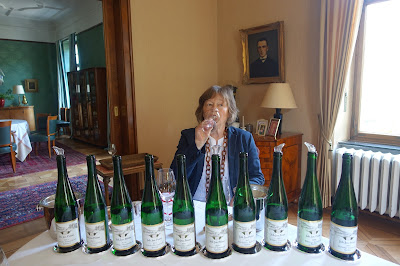






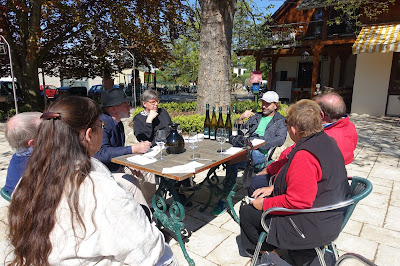




















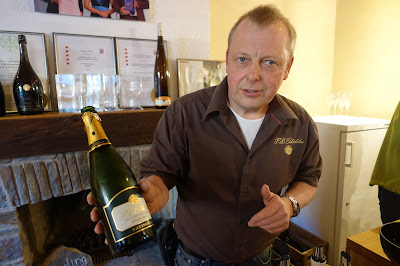

























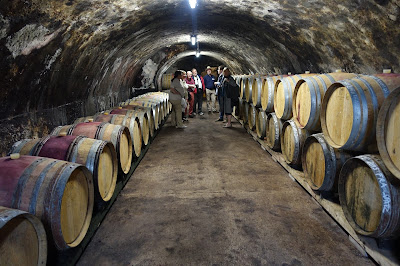









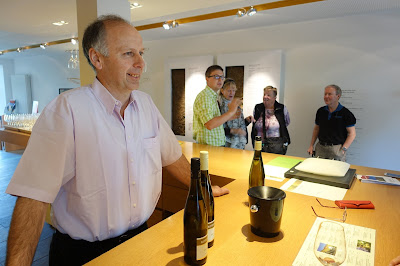



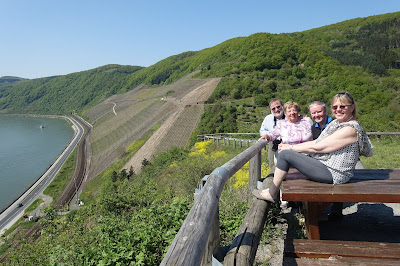








































































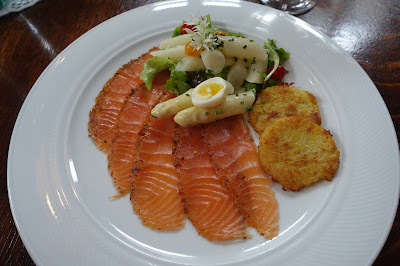






































No comments:
Post a Comment